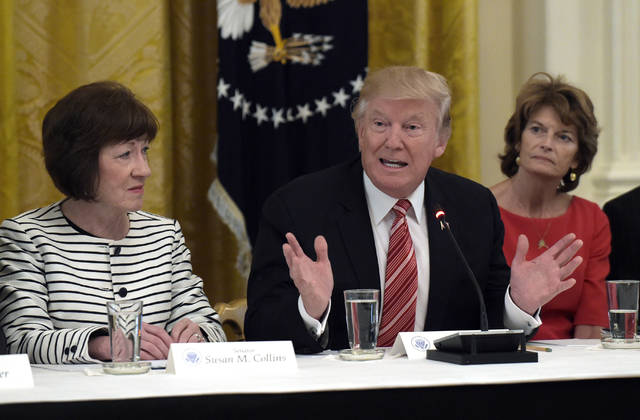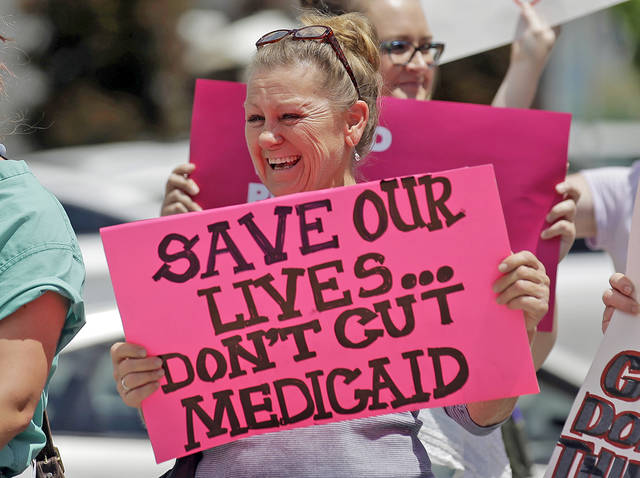WASHINGTON — Senate GOP leaders abruptly shelved their long-sought health care overhaul Tuesday, asserting they can still salvage it but raising new doubts about whether President Donald Trump and the Republicans will ever deliver on their promises to repeal and replace “Obamacare.”
WASHINGTON — Senate GOP leaders abruptly shelved their long-sought health care overhaul Tuesday, asserting they can still salvage it but raising new doubts about whether President Donald Trump and the Republicans will ever deliver on their promises to repeal and replace “Obamacare.”
Republican leader Mitch McConnell announced a delay for any voting at a closed-door senators’ lunch also attended by Vice President Mike Pence. McConnell’s tone was matter-of-fact, according those present, yet his action amounts to a stinging setback for the longtime Senate leader who had developed the legislation largely in secret as Trump hung back in deference.
Now Trump seems likely to push into the discussion more directly, and he immediately invited Senate Republicans to the White House. But the message he delivered to them before reporters were ushered out of the room was not entirely hopeful.
“This will be great if we get it done, and if we don’t get it done it’s just going to be something that we’re not going to like, and that’s OK and I understand that very well,” he told the senators, who surrounded him at tables arranged in a giant square in the East Room. Most wore grim expressions.
In the private meeting that followed, said Marco Rubio of Florida, the president spoke of “the costs of failure, what it would mean to not get it done — the view that we would wind up in a situation where the markets will collapse and Republicans will be blamed for it and then potentially have to fight off an effort to expand to single payer at some point.”
The bill has many critics and few outspoken fans on Capitol Hill. It was short of support heading toward a critical procedural vote on Wednesday, and prospects for changing that are uncertain. McConnell promised to revisit the legislation after Congress’ July 4 recess.
“It’s a big complicated subject, we’ve got a lot discussions going on, and we’re still optimistic we’re going to get there,” McConnell told reporters after the lunch.
It hasn’t been easy, as adjustments to placate conservatives, who want the legislation to be more stringent, only push away moderates who think its current limits — on Medicaid for example — are too strong.
In the folksy analysis of John Cornyn of Texas, the Senate GOP vote-counter: “Every time you get one bullfrog in the wheelbarrow, another one jumps out.”
McConnell has scant margin for error in the closely divided Senate, and the legislation to eliminate Obamacare’s mandates and unwind its Medicaid expansion has shed support practically from the moment it was unveiled last Thursday. By Tuesday morning at least five GOP senators had announced their opposition to a procedural vote on the bill, and after McConnell announced the delay several more went public with their criticism.
McConnell can lose only two senators from his 52-member caucus and still pass the bill, with Pence to cast a tie-breaking vote. Democrats are unanimously opposed, and in recent days they have stepped up protests, delivering speeches on the Senate floor for hours and holding vigils on the Capitol steps.
Medical groups are nearly unanimously opposed, too, along with the AARP, though the U.S. Chamber of Commerce supports the bill.
A number of GOP governors oppose the legislation, especially in states that have expanded the Medicaid program for the poor under former President Barack Obama’s Affordable Care Act. Opposition from Nevada’s popular Republican Gov. Brian Sandoval helped push GOP Sen. Dean Heller, who is vulnerable in next year’s midterms, to denounce the legislation last Friday; Ohio’s Republican Gov. John Kasich held an event at the National Press Club Tuesday to criticize it.
But the Republicans’ own divisions are what has stymied them.
In one illustration, an outside political group run by Trump allies has run ads against Heller and threatens more against other GOP senators opposed to the bill. That infuriated McConnell, who called White House Chief of Staff Reince Priebus to label the attacks “beyond stupid.” Heller himself raised the issue in the Tuesday White House meeting, Sen. John Thune of South Dakota told reporters later. The group took down the ads Tuesday night.
The House went through its own struggles with its version of the bill, pulling it from the floor short of votes before reviving it and narrowly passing it in May. So it’s quite possible that the Senate Republicans can rise from this week’s setback.


